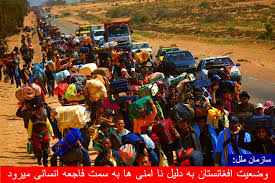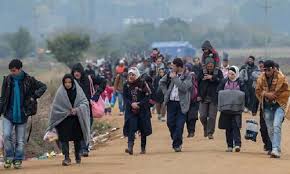The situation of immigrants in neighboring countries

The situation of Afghan immigrants in neighboring countries, especially Iran and Pakistan, is associated with many challenges. These countries have hosted millions of Afghan immigrants for decades, but the living conditions of these immigrants are difficult due to economic, legal, and social problems. Here are some key aspects of the situation of Afghan refugees in these countries:
-
Iran:
Legal conditions: Many Afghan immigrants live in Iran without legal documents, which makes them have limited access to social, health, and educational services. In addition, there is always the possibility of arrest and deportation for those who do not have legal documents.- Work and Livelihood: Many Afghan immigrants in Iran work in informal jobs with low wages. These people often work in hard working conditions and without legal protection from their employers.
- Education: Afghan immigrant children in Iran face many obstacles to access education. Although some measures have been taken in recent years to increase their access to schools, many children are still deprived of education.
-
Pakistan:
- Immigrant camps: Many Afghan immigrants live in special camps for immigrants in Pakistan. These camps often face limited facilities and poor living conditions.
- Legal status: The legal status of Afghan immigrants in Pakistan is also complicated. Many of them live without legal documents and face the risk of arrest and deportation. This situation has caused these immigrants to face problems in accessing health and educational services.
- Forced return: In recent years, the Pakistani government has tried to encourage Afghan immigrants to return to their country, but many of these immigrants do not want to return due to the insecure conditions of Afghanistan.
-
Other neighboring countries:
- A number of Afghan immigrants live in other countries such as Tajikistan, Turkmenistan, and Uzbekistan, but due to the limited capacities of these countries and weak economic conditions, these immigrants are facing similar problems.
- General challenges:
Racism and discrimination: Afghan immigrants in neighboring countries often face racism and discrimination. This makes their daily life more difficult and causes social isolation.
- Lack of international support: Considering the high number of Afghan immigrants and the pressure on the host countries, international support for these immigrants is not enough and there is a need to increase aid and pay attention to their situation.
In general, Afghan immigrants face many challenges in neighboring countries, and improving their situation requires more international cooperation and reforms in the immigration and social policies of the host countries.

Does immigration think of returning to Afghanistan?
Many Afghan immigrants in neighboring countries such as Iran and Pakistan are facing the issue of returning to Afghanistan, but the decision is complicated for various reasons. The factors that affect the decision of immigrants to return to Afghanistan are:
-
Security situation in Afghanistan:
- Concern about violence and insecurity: The security situation in Afghanistan, especially after the Taliban took over in August 2021, is still unstable. Terrorist groups such as ISIS-Khorasan are still active, and internal conflicts continue. Many immigrants do not want to return due to fear of violence and insecurity.
-
Economic situation:
- Poverty and unemployment: The economic conditions in Afghanistan are very dire. Widespread unemployment, poverty, and lack of economic opportunities make immigrants unwilling to return to the country to secure their livelihood.
-
Social and cultural issues:
- Lack of access to basic services: Many areas of Afghanistan are still deprived of access to basic services such as health and education. Migrants who have access to relative services in neighboring countries may consider this situation in their decision to return.
-
Conditions in host countries:
- Economic and legal pressures: Some immigrants may think of returning due to economic pressures, legal problems, and discrimination in the host countries. However, for many of them, the situation in Afghanistan is so difficult that this option is not attractive.
-
Mandatory return programs:
Forced return: Some countries, especially Pakistan, have increased the pressure on Afghan immigrants to return to their country in recent years. This has forced some migrants to return, although many of them do not seek to return due to the lack of security and economic opportunities in Afghanistan. -
hope for improvement:
- Waiting for the situation to improve: Some migrants may refuse to return now and look for a better opportunity to return, hoping that the situation in Afghanistan will improve in the future.
In general, the willingness of Afghan immigrants to return to their country is influenced by a combination of security, economic, social, and political factors. For many of them, returning to Afghanistan is a difficult and risky choice in the current situation.